| Listing 1 - 10 of 11 | << page >> |
Sort by
|
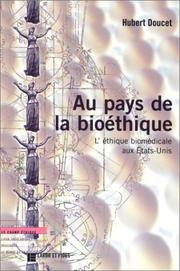
ISBN: 2830908198 9782830908190 Year: 1996 Volume: 29 Publisher: Genève: Labor et Fides,
Abstract | Keywords | Export | Availability | Bookmark
 Loading...
Loading...Choose an application
- Reference Manager
- EndNote
- RefWorks (Direct export to RefWorks)
La bioéthique est née à la fin des années 60, à la foi protestation contre la médecine scientifique qui avait perdu le sens de la compassion médicale, et pour intégrer de façon responsable les progrès biomédicaux à l'ensemble de la vie sociale. Dans le contexte politique, juridique et culturel américain, elle s'est rapidement institutionnalisée dans le droit du patient à prendre toute décision médicale qui le concerne. La nature même de la médecine, en particulier la relation médecin-patient, en a été transformée: des comités d'éthique sont chargés d'arbitrer les conflits qui ne cessent de naître autour du respect ou non des quatre principes de la bioéthique - l'autonomie, la bienfaisance, la non-malfaisance et la justice - eux-mêmes mis en question par les courants nouveaux que sont aujourd'hui le communautarisme, l'éthique de la vertu ou l'éthique féministe. Les lecteurs de culture française trouveront ici de quoi mieux cerner la nature de l'entreprise bioéthique américaine qui exerce un incontestable leadership dans ce domaine.

ISBN: 0801861705 9780801861703 Year: 1999 Publisher: Baltimore: Johns Hopkins University press,
Abstract | Keywords | Export | Availability | Bookmark
 Loading...
Loading...Choose an application
- Reference Manager
- EndNote
- RefWorks (Direct export to RefWorks)
Medical ethics --- Social aspects --- beroepsethiek (ethische beroepscodes) --- bio-ethiek (medische, biomedische ethiek, bio-ethische aspecten) --- éthique professionnelle (code d'éthique) --- bioéthique (éthique médicale, biomédicale, aspects bioéthiques) --- Biomedical ethics --- Clinical ethics --- Ethics, Medical --- Health care ethics --- Medical care --- Medicine --- Bioethics --- Professional ethics --- Nursing ethics --- Social medicine --- Moral and ethical aspects --- Medical ethics - United States --- Medical ethics - Social aspects - United States
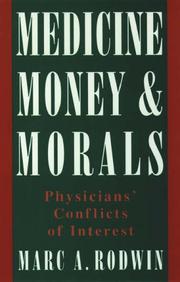
ISBN: 0195096479 9780195096477 Year: 1993 Publisher: New York: Oxford university press,
Abstract | Keywords | Export | Availability | Bookmark
 Loading...
Loading...Choose an application
- Reference Manager
- EndNote
- RefWorks (Direct export to RefWorks)
Professional ethics. Deontology --- Human medicine --- Cost control --- Medical ethics --- Medical care, Cost of --- Medical care --- Physicians --- Conflict of interests --- Moral and ethical aspects --- Professional ethics --- Medical ethics - United States --- Medical care, Cost of - Moral and ethical aspects - United States --- Medical care - United States - Cost control --- Physicians - Professional ethics - United States
Book
ISBN: 0190267658 1282544241 9786612544248 0199749493 019539173X 0199840717 9780199749492 9780195391732 9780190267650 9780199840717 0190452994 Year: 2010 Publisher: Oxford: Oxford university press,
Abstract | Keywords | Export | Availability | Bookmark
 Loading...
Loading...Choose an application
- Reference Manager
- EndNote
- RefWorks (Direct export to RefWorks)
Bioethics, still in its infancy, is routinely called on by the government to provide political cover for controversial public health decisions involving the life and death of Americans. Doomsday or worst-case scenarios are often at the heart of these biopolitical decisions. A central feature of science fiction, these scenarios can impart useful insights. But worst-case scenarios, like Frankenstein's monster, can also be unpredictably destructive, undermining both preparedness and the very values, bioethics seeks to promote. Discovering a new flu strain, for example, leads immediately to visions of the 1918 flu pandemic, the worst in human history. Likewise, a "ticking time bomb" scenario leads to the use of physicians for torture, and the all purpose worst case charge of "socialism" threatens to derail meaningful healthcare reform." "In Worst Case Bioethics George Annas employs contemporary disputes involving death and disaster to explore the radical changes underway in public health practice, the application of constitutional law to medicine, and human rights discourse to promote human health and well-being. Worst-case scenarios, especially worst-case bioethics scenarios, distort debate, limit options, rationalize human rights abuses, and undermine equality and social justice. It is, nonetheless, possible to temper worst-case scenarios in ways that promote both the development of a meaningful American bioethics, and a life and liberty affirming global health and human rights movement.
Medical ethics --- Medical care --- Public health --- Medical policy --- bio-ethiek (medische, biomedische ethiek, bio-ethische aspecten) --- Verenigde Staten --- bioéthique (éthique médicale, biomédicale, aspects bioéthiques) --- Etats Unis --- Medical ethics - United States --- Medical care - United States --- Public health - United States --- Medical policy - United States --- Droit médical --- Etats-Unis --- Ethics --- Public Health --- Health Policy
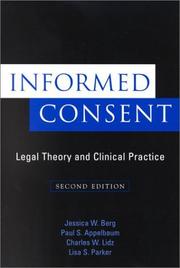
ISBN: 0197561381 1280831057 0199747784 9780199747788 0195126777 9780195126778 9786610831050 661083105X 9781280831058 Year: 2001 Publisher: New-York: Oxford university press,
Abstract | Keywords | Export | Availability | Bookmark
 Loading...
Loading...Choose an application
- Reference Manager
- EndNote
- RefWorks (Direct export to RefWorks)
Informed consent - as an ethical ideal and legal doctrine - has been the source of much concern to clinicians. Drawing on a diverse set of backgrounds and two decades of research in clinical settings, the authors - a lawyer, a physician, a social scientist, and a philosopher - help clinicians understand and cope with their legal obligations and show how the proper handling of informed consent can improve , rather than impede, patient care. Following a concise review of the ethical and legal foundations of informed consent, they provide detailed, practical suggestions for incorporating informed consent into clinical practice. This completely revised and updated edition discusses how to handle informed consent in all phases of the updated edition discusses how to handle informed consent in all phases of the doctor-patient relationship, use of consent forms, patients' refusals of treatment, and consent to research. It comments on recent laws and national policy, and addresses cutting edge issues such as fulfilling physician obligations under managed care. This clear and succinct book contains a weath of information that will not only help clinicians meet the legal requirements of informed consent and understand its ethical underpinnings, but also enhance their ability to deal with their patients more effectively. It will be of value to all those working in areas where issues of informed consent are likely to arise, including medicine, biomedical research, mental health care, nursing, dentistry, biomedical ethics, and law.
Informed consent (Medical law) --- Physician and patient --- Medical ethics --- arts-patiëntrelatie --- bio-ethiek (medische, biomedische ethiek, bio-ethische aspecten) --- geïnformeerde vrijwillige toestemming (instemming) --- medische praktijk --- medisch recht (biomedisch recht) --- relation médecin-patient --- bioéthique (éthique médicale, biomédicale, aspects bioéthiques) --- consentement libre et éclairé --- pratique médicale --- droit médical (droit biomédical) --- Informed consent (Medical law) - United States --- Medical ethics - United States --- Physician and patient - United States
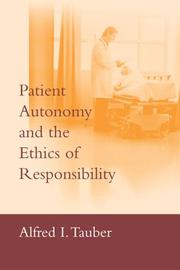
ISBN: 0262201607 026270112X 9780262701129 9780262201605 Year: 2005 Publisher: Cambridge, Mass.: MIT Press,
Abstract | Keywords | Export | Availability | Bookmark
 Loading...
Loading...Choose an application
- Reference Manager
- EndNote
- RefWorks (Direct export to RefWorks)
A philosophical discussion of the doctor-patient relationship that argues for enhanced patient antonomy based on the ethics of physician responsibility and a science of value-based decision making. The principle of patient autonomy dominates the contemporary debate over medical ethics. In this examination of the doctor-patient relationship, physician and philosopher Alfred Tauber argues that the idea of patient autonomy - which was inspired by other rights-based movements of the 1960s - was an extrapolation from political and social philosophy that fails to ground medicine's moral philosophy. He proposes instead a reconfiguration of personal autonomy and a renewed commitment to an ethics of care. In this formulation, physician beneficence and responsibility become powerful means for supporting the autonomy and dignity of patients. Beneficence, Tauber argues, should not be confused with the medical paternalism that fuelled the patient rights movement. Rather, beneficence and responsibility are moral principles that not only are compatible with patient autonomy but strengthen it.
autonomie van de patiënt --- arts-patiëntrelatie --- autonomie du patient --- relation médecin-patient --- Patient participation --- Physician and patient --- Medical ethics --- Autonomy (Philosophy) --- Patient Care --- Patient Rights --- Ethics, Clinical --- Patient Participation --- Personal Autonomy --- Physician-Patient Relations --- Moral and ethical aspects --- ethics --- Doctor and patient --- Doctor-patient relationships --- Patient and doctor --- Patient and physician --- Patient-doctor relationships --- Patient-physician relationships --- Patients and doctors --- Patients and physicians --- Physician-patient relationships --- Physicians and patients --- Interpersonal relations --- Fear of doctors --- Narrative medicine --- Medical cooperation --- Participation --- Therapist and patient --- Philosophy --- Patient participation - United States --- Physician and patient - Moral and ethical aspects - United States --- Medical ethics - United States --- Patient Care - ethics --- Patient Rights - ethics --- Physician-Patient Relations - ethics

ISBN: 0897664566 9780897664561 Year: 1988 Volume: 530 Publisher: New York (N.Y.): New York Academy of Sciences,
Abstract | Keywords | Export | Availability | Bookmark
 Loading...
Loading...Choose an application
- Reference Manager
- EndNote
- RefWorks (Direct export to RefWorks)
Professional ethics. Deontology --- Human medicine --- Medical ethics --- Bioethics --- Ethics, Medical --- Congresses --- Bioethics. --- Ethics, Medical. --- 17.023.33 --- -Bioethics --- -Medical ethics --- -#WPLT:dd.prof.J.Vendrig --- Biomedical ethics --- Clinical ethics --- Health care ethics --- Medical care --- Medicine --- Professional ethics --- Nursing ethics --- Social medicine --- Biology --- Life sciences --- Life sciences ethics --- Science --- Medical Ethics --- Professionalism --- Biomedical Ethics --- Health Care Ethics --- Ethics, Biomedical --- Ethics, Health Care --- Ethicists --- Biologische doeleinden. Bio-ethiek; bioethiek. Übermensch. Medische deontologie --- Moral and ethical aspects --- ethics --- Congresses. --- congresses --- congresses. --- 17.023.33 Biologische doeleinden. Bio-ethiek; bioethiek. Übermensch. Medische deontologie --- #WPLT:dd.prof.J.Vendrig --- United States --- Great Britain --- Medical ethics - United States - Congresses --- Medical ethics - Great Britain - Congresses --- Bioethics - United States - Congresses --- Bioethics - Great Britain - Congresses --- Ethics, Medical - congresses --- Bioethics - congresses
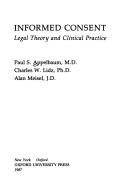
ISBN: 019503841X 9780195038415 Year: 1987 Publisher: New York (N.Y.): Oxford university press,
Abstract | Keywords | Export | Availability | Bookmark
 Loading...
Loading...Choose an application
- Reference Manager
- EndNote
- RefWorks (Direct export to RefWorks)
Medical ethics --- Physician and patient --- Informed consent (Medical law) --- 174.2 --- -Medical ethics --- -Physician and patient --- -Doctor and patient --- Doctor-patient relationships --- Patient and doctor --- Patient and physician --- Patient-doctor relationships --- Patient-physician relationships --- Patients and doctors --- Patients and physicians --- Physician-patient relationships --- Physicians and patients --- Interpersonal relations --- Fear of doctors --- Narrative medicine --- Biomedical ethics --- Clinical ethics --- Ethics, Medical --- Health care ethics --- Medical care --- Medicine --- Bioethics --- Professional ethics --- Nursing ethics --- Social medicine --- Beroepsmoraal van de artsen. Medische beroepsethiek --- Moral and ethical aspects --- Decision Making. --- Ethics, Medical. --- Informed Consent --- legislation. --- -Beroepsmoraal van de artsen. Medische beroepsethiek --- -174.2 Beroepsmoraal van de artsen. Medische beroepsethiek --- Doctor and patient --- 174.2 Beroepsmoraal van de artsen. Medische beroepsethiek --- Medical ethics - United States --- Physician and patient - United States --- Informed consent (Medical law) - United States --- Legislation.
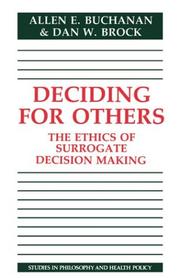
ISBN: 0521311969 052132422X 1139171941 9780521311960 9781139171946 9780521324229 Year: 1989 Publisher: Cambridge : Cambridge university press,
Abstract | Keywords | Export | Availability | Bookmark
 Loading...
Loading...Choose an application
- Reference Manager
- EndNote
- RefWorks (Direct export to RefWorks)
This book is the most comprehensive treatment available of one of the most urgent - and yet in some respects most neglected - problems in bioethics: decision-making for incompetents. Part I develops a general theory for making treatment and care decisions for patients who are not competent to decide for themselves. It provides an in-depth analysis of competence, articulates and defends a coherent set of principles to specify suitable surrogate decisionmakers and to guide their choices, examines the value of advance directives, and investigates the role that considerations of cost ought to play in decisions concerning incompetents. Part II applies this theoretical framework to the distinctive problems of three important classes of individuals, many of whom are incompetent: minors, the elderly and psychiatric patients. The authors' approach combines a probing analysis of fundamental issues in ethical theory with a sensitive awareness of the concrete realities of health care institutions and the highly personal and individual character of difficult practical problems. Its broad scope will appeal to health professionals, moral philosophers and lawyers alike.
autonomie van de patiënt --- wilsbekwaamheid (wilsbekwame patiënten) --- ethiek (ethische aspecten) --- minderjarigen --- bejaarde --- psychiatrische patient (geesteszieke) --- autonomie du patient --- capacité --- ethique (aspects ethiques) --- mineurs --- personne agée --- patient psychiatrique (malade mentale) --- Medical ethics --- Bioethics --- Medical jurisprudence --- Decision making --- Decision making. --- Moral and ethical aspects --- #GBIB:CBMER --- Forensic medicine --- Injuries (Law) --- Jurisprudence, Medical --- Legal medicine --- Biomedical ethics --- Clinical ethics --- Ethics, Medical --- Health care ethics --- Medical care --- Medicine --- Deciding --- Decision (Psychology) --- Decision analysis --- Decision processes --- Making decisions --- Management --- Management decisions --- Biology --- Life sciences --- Life sciences ethics --- Moral and ethical aspects&delete& --- Forensic sciences --- Medical laws and legislation --- Professional ethics --- Nursing ethics --- Social medicine --- Choice (Psychology) --- Problem solving --- Science --- Arts and Humanities --- Philosophy --- Medical ethics - United States - Decision making. --- Bioethics - United States - Decision making. --- Medical jurisprudence - Moral and ethical aspects - United States - Decision making. --- Decision making - Moral and ethical aspects - United States.
Book
ISBN: 0801842484 Year: 1991 Volume: vol *9 Publisher: Baltimore London Johns Hopkins University Press
Abstract | Keywords | Export | Availability | Bookmark
 Loading...
Loading...Choose an application
- Reference Manager
- EndNote
- RefWorks (Direct export to RefWorks)
Geriatrics --- Sociology of health --- Professional ethics. Deontology --- Age group sociology --- Social policy and particular groups --- Aged. --- Ethics, Medical. --- Health Care Costs. --- Health Care Rationing --- Health Services for the Aged --- Public Policy. --- Socioeconomic Factors. --- #GBIB:CBMER --- Factors, Socioeconomic --- High-Income Population --- Inequalities --- Land Tenure --- Standard of Living --- Factor, Socioeconomic --- High Income Population --- High-Income Populations --- Inequality --- Living Standard --- Living Standards --- Population, High-Income --- Populations, High-Income --- Socioeconomic Factor --- Tenure, Land --- Economics --- Migration Policy --- Population Policy --- Social Protection --- Social Policy --- Migration Policies --- Policies, Migration --- Policies, Population --- Policies, Public --- Policies, Social --- Policy, Migration --- Policy, Population --- Policy, Public --- Policy, Social --- Population Policies --- Protection, Social --- Public Policies --- Social Policies --- Policy Making --- Social Control, Formal --- Costs, Medical Care --- Health Costs --- Healthcare Costs --- Medical Care Costs --- Treatment Costs --- Cost, Health --- Cost, Health Care --- Cost, Healthcare --- Cost, Medical Care --- Cost, Treatment --- Costs, Health --- Costs, Health Care --- Costs, Healthcare --- Costs, Treatment --- Health Care Cost --- Health Cost --- Healthcare Cost --- Medical Care Cost --- Treatment Cost --- Health Expenditures --- Medical Ethics --- Medicine --- Professionalism --- Bioethics --- Elderly --- Longevity --- economics. --- ethics --- United States. --- Medical care, Cost of --- Medical ethics --- Older people --- Aged --- Ethics, Medical --- Health Care Costs --- Public Policy --- Socioeconomic Factors --- Medical care --- economics --- United States --- Medical care [Cost of ] --- Aged - Medical care - United States. --- Medical ethics - United States. --- Medical care, Cost of - United States. --- Affirmative Action --- Action, Affirmative --- Social Inequalities --- Social Inequality --- Inequalities, Social --- Inequality, Social --- Economic and Social Factors --- Social and Economic Factors --- Socioeconomic Characteristics --- Characteristic, Socioeconomic --- Socioeconomic Characteristic
| Listing 1 - 10 of 11 | << page >> |
Sort by
|

 Search
Search Feedback
Feedback About UniCat
About UniCat  Help
Help News
News